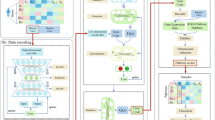Abstract
A large number of gene expression profile datasets mainly exist in the fields of biological information and gene microarrays. Traditional classification approaches are hard to gain a good performance in the gene expression profile data, due to the characteristics of high dimensionality and small sample size of gene expression profile datasets. In fact, as a data a augmentation technology, Wasserstein generative adversarial network based on gradient penalty (WGAN-GP) with conditional generative adversarial network (CWGAN-GP) can generate specified label samples in a simple fully connected network and is beneficial to improve the performance of the classification model. However, this data enhancement method generates the samples with low diversity and distribution uncertainty and decrease the classification accuracy. Therefore, this paper proposes a conditional Wasserstein generative adversarial network based on the gene expression datasets (Gene-CWGAN). Gene-CWGAN adopts a datasets division strategy based on the data distribution to help the model maintain the distribution of realistic samples. Subsequently, Gene-CWGAN enhances the diversity and quality of generated samples by removing the activation function of the output layer and adding constraint penalty items. Finally, Gene-CWGAN is compared with CGAN and CWGAN-GP on Colon, Leukemia2 and SRBCT verified to effectively improve the diversity and distribution stability of generated samples.
Access this chapter
Tax calculation will be finalised at checkout
Purchases are for personal use only
Similar content being viewed by others
References
Shah, S.H., Iqbal, M.J., Ahmad, I., Khan, S., Rodrigues, J.J.P.C.: Optimized gene selection and classification of cancer from microarray gene expression data using deep learning. Neural Comput. Appl. 1–12 (2020)
Aduviri, R., Matos, D., Villanueva, E.: Feature selection algorithm recommendation for gene expression data through gradient boosting and neural network metamodels. In: Proceedings of 2018 IEEE International Conference on Bioinformatics and Biomedicine (BIBM), pp. 2726–2728 (2018)
Yuan, J., Li, K.: The fault diagnosis model for railway system based on an improved feature selection method. In: Proceedings of 2019 IEEE 9th International Conference on Electronics Information and Emergency Communication (ICEIEC), pp. 1–4 (2019)
Fang, F., Lv, Q.Q., Wang, M.S., Yang, X.H., Zhou, Q.G., Zhou, R.: A hybrid feature selection algorithm applied to high-dimensional imbalanced small-sample data classification. In: Proceedings of 2019 Asia-Pacific Signal and Information Processing Association Annual Summit and Conference (APSIPA ASC), pp. 41–46 (2019)
Roth, H.R., et al.: Anatomy-specific classification of medical images using deep convolutional nets. In: Proceedings of 2015 IEEE 12th International Symposium on Biomedical Imaging (ISBI), pp. 101–104 (2015)
Omer, D.: Classification of heart sounds with re-sampled energy method. In: Proceedings of 2018 26th Signal Processing and Communications Applications Conference (SIU), pp. 1–4 (2018)
Goodfellow, I.J., et al.: Generative adversarial nets. In: Proceedings of Advances in Neural Information Processing Systems (NIPS), pp. 2672–2680 (2014)
Mirza, M., Simon, O.: Conditional generative adversarial nets. arXiv e-prints, arXiv:1411.1784 (2014)
Wang, M., et al.: Semi-supervised capsule cGAN for speckle noise reduction in retinal OCT images. IEEE Trans. Med. Imaging 40(4), 1168–1183 (2021)
Chen, L.Y., Liu, Y.F., Xiao, W.D., Wang, Y.X., Xie, H.Y.: SpeakerGAN: speaker identification with conditional generative adversarial network. Neurocomputing 418(22), 211–220 (2020)
Martin, A., Soumith, C., Léon, B.: Wasserstein generative adversarial networks. In: Proceedings of Proceedings of the 34th International Conference on Machine Learning (ICML), pp. 214–223 (2017)
Gulrajani, I., Ahmed, F., Arjovsky, M., Dumoulin, V., Courville, A.: Improved training of wasserstein GANs. In: Proceedings of Advances in Neural Information Processing Systems (NIPS), pp. 5767–5777 (2017)
Gao, X., Deng, F., Yue, X.H.: Data augmentation in fault diagnosis based on the Wasserstein generative adversarial network with gradient penalty. Neurocomputing 396, 487–494 (2020)
Luo, Y.Y., Lu, H.G., Jia, N.: Super-resolution algorithm of satellite cloud image based on WGAN-GP. In: Proceedings of 2019 International Conference on Meteorology Observations (ICMO), pp. 1–4 (2019)
Huang, Z.X., et al.: Considering anatomical prior information for low-dose CT image enhancement using attribute-augmented wasserstein generative adversarial networks. Neurocomputing 428(7), 104–115 (2021)
Liu, D.Y., Huang, X.P., Zhan, W.F., Ai, L.F., Zheng, X., Cheng, S.L.: View synthesis-based light field image compression using a generative adversarial network. Inf. Sci. 545(4), 118–131 (2021)
Jiang, Y.F., Chen, H., Loew, M., Ko, H.: COVID-19 CT image synthesis with a conditional generative adversarial network. IEEE J. Biomed. Health Inform. 25(2), 441–452 (2021)
Zhu, Z.X., Ong, Y.S., Dash, M.: Markov blanket-embedded genetic algorithm for gene selection. Pattern Recogn. 40(11), 3236–3248 (2007)
Genuer, R., Poggi, J.M., Tuleau-Malot, C.: Variable selection using random forests. Pattern Recogn. Lett. 31(14), 2225–2236 (2010)
Acknowledgments
This work was supported by National Natural Science Foundation of China under Grant nos. 61976108 and 61572241.
Author information
Authors and Affiliations
Corresponding author
Editor information
Editors and Affiliations
Rights and permissions
Copyright information
© 2021 Springer Nature Singapore Pte Ltd.
About this paper
Cite this paper
Zhu, S., Han, F. (2021). A Data Enhancement Method for Gene Expression Profile Based on Improved WGAN-GP. In: Zhang, H., Yang, Z., Zhang, Z., Wu, Z., Hao, T. (eds) Neural Computing for Advanced Applications. NCAA 2021. Communications in Computer and Information Science, vol 1449. Springer, Singapore. https://doi.org/10.1007/978-981-16-5188-5_18
Download citation
DOI: https://doi.org/10.1007/978-981-16-5188-5_18
Published:
Publisher Name: Springer, Singapore
Print ISBN: 978-981-16-5187-8
Online ISBN: 978-981-16-5188-5
eBook Packages: Computer ScienceComputer Science (R0)




